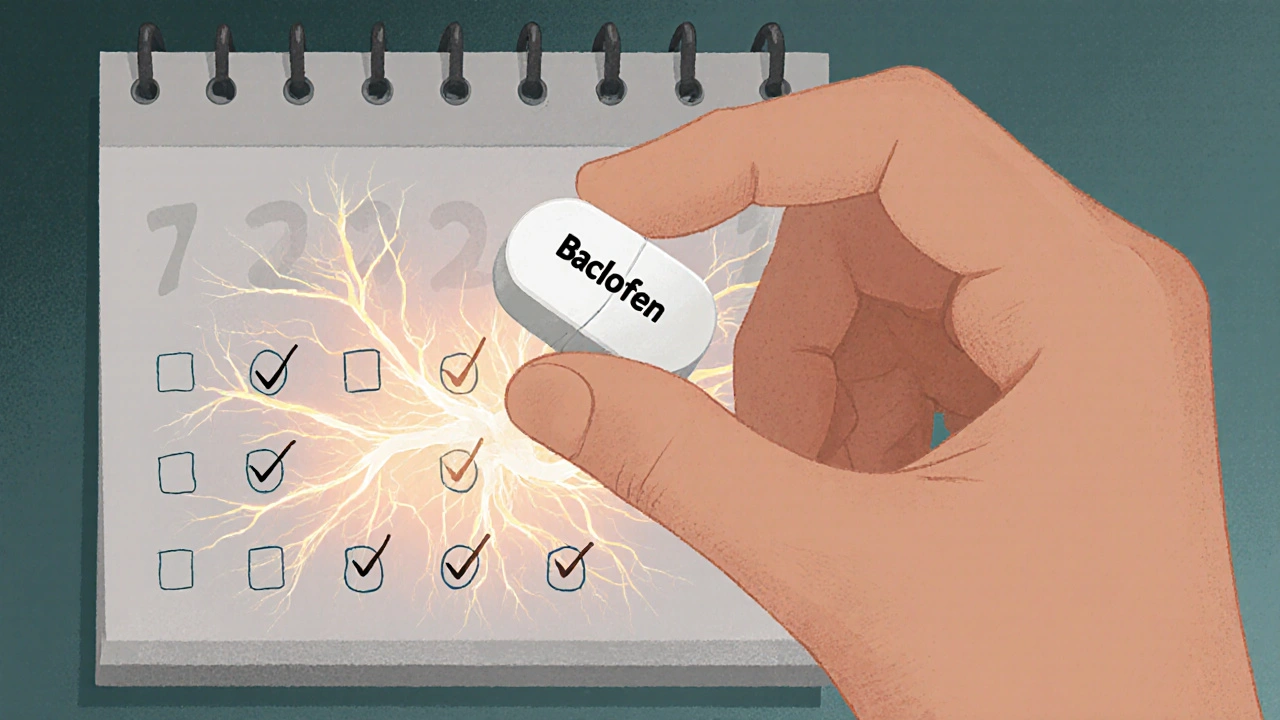Lioresal: What It Is, How It Works, and Who It's For
 Jun, 21 2025
Jun, 21 2025
Lioresal is the brand name for baclofen, a muscle relaxant used primarily to treat muscle spasticity caused by conditions like multiple sclerosis, spinal cord injuries, or cerebral palsy. It doesn’t cure these conditions, but it helps people move more easily and live with less pain. If you’ve been told you need Lioresal, you’re probably looking for clear, honest answers-not medical jargon or vague promises.
How Lioresal Actually Works in Your Body
Lioresal works by targeting GABA-B receptors in your spinal cord and brain. These receptors help control how your nerves send signals to your muscles. When you have spasticity, your nerves fire too much, causing muscles to stiffen, cramp, or lock up. Lioresal steps in and slows down those signals, reducing the unwanted muscle tension.
It’s not like a regular painkiller. You won’t feel immediate relief like you would with ibuprofen. Instead, it takes days or even weeks to build up in your system and stabilize muscle tone. People often notice the biggest changes in morning stiffness, nighttime spasms, or difficulty walking. One 2023 study tracking 312 patients with spinal cord injury found that 68% reported improved mobility after four weeks of consistent use at standard doses.
Who Gets Prescribed Lioresal
Lioresal isn’t for every kind of muscle tightness. It’s specifically for spasticity-when muscles become overly active due to damage in the central nervous system. Common conditions include:
- Multiple sclerosis (MS)
- Spinal cord injuries
- Cerebral palsy
- Stroke-related muscle stiffness
- Some forms of traumatic brain injury
If your muscle tightness comes from arthritis, overuse, or poor posture, Lioresal won’t help. Those issues need different treatments-physical therapy, stretching, or anti-inflammatories. Lioresal only works when the problem starts in your brain or spinal cord.
Dosing: What’s Right for You
Dosage varies a lot depending on your condition, age, and how your body responds. Most adults start at 5 mg three times a day. Your doctor will slowly increase it, usually by 5 mg every three days, until symptoms improve or side effects appear. The average maintenance dose is between 20 mg and 80 mg per day, split into three or four doses.
Older adults or people with kidney problems often need lower doses. Baclofen is cleared by the kidneys, so if your kidney function is reduced, the drug can build up and cause drowsiness, confusion, or even seizures. Always tell your doctor about other medications you take-especially sedatives, antidepressants, or alcohol-because they can make Lioresal’s side effects worse.
Side Effects You Should Know About
Most people tolerate Lioresal well, but side effects are common, especially at the start. The most frequent ones include:
- Drowsiness (affects about 40% of users)
- Dizziness
- Weakness
- Nausea
- Headache
Less common but serious risks include hallucinations, low blood pressure, or seizures if you stop the drug suddenly. Never quit Lioresal on your own. If you need to stop, your doctor will taper you down slowly over weeks. Abrupt withdrawal can trigger muscle rigidity, high fever, or even life-threatening complications.
Some people report mood changes-feeling depressed or anxious. If this happens, tell your doctor. It doesn’t mean you have to stop the medication, but your treatment plan may need adjusting.

How Long Does It Take to Work?
Don’t expect miracles on day one. Many patients notice slight improvement within a week, but full effects usually take 2-4 weeks. That’s because Lioresal doesn’t just relax muscles-it helps your nervous system re-adjust over time.
Some people think if they don’t feel better right away, the drug isn’t working. That’s a mistake. The goal isn’t to feel “normal” overnight. It’s to reduce spasms enough that you can sleep better, transfer from a wheelchair more easily, or dress yourself without help. Those small wins matter.
What Happens If You Miss a Dose?
If you forget a dose, take it as soon as you remember-unless it’s almost time for the next one. Never double up. Missing one dose usually won’t cause problems, but skipping several in a row can trigger withdrawal symptoms, even if you’ve only been on it for a few weeks.
Set phone alarms. Use pill organizers. Ask a family member to remind you. Consistency is key. Lioresal works best when your blood levels stay steady.
Alternatives to Lioresal
If Lioresal doesn’t work for you-or if side effects are too strong-there are other options:
- Tizanidine (Zanaflex): Works faster but has stronger sedative effects. Often used for short-term spasticity.
- Dantrolene (Dantrium): Acts directly on muscles, not nerves. Used for severe cases but carries liver risk.
- Botox injections: Target specific muscles. Great for localized spasticity, like a clenched fist or stiff ankle.
- Intrathecal baclofen pump: A surgically implanted device delivers baclofen directly into spinal fluid. Used for severe, widespread spasticity that doesn’t respond to pills.
Physical therapy and stretching are almost always combined with medication. Medication alone rarely fixes movement problems. You need both.
What to Avoid While Taking Lioresal
There are three big things to avoid:
- Alcohol-it multiplies drowsiness and dizziness. Even one drink can make you unsteady.
- Driving or operating machinery-especially in the first few weeks. Wait until you know how your body reacts.
- Stopping suddenly-as mentioned, this can be dangerous. Always follow your doctor’s tapering plan.
Also, avoid over-the-counter sleep aids or cold medicines with diphenhydramine (like Benadryl). They can interact with Lioresal and increase confusion or drowsiness.

Long-Term Use and Monitoring
Lioresal can be taken long-term. Many people use it for years. But regular check-ins with your doctor are important. Every 3-6 months, ask for:
- A kidney function test (creatinine clearance)
- A review of your muscle tone and mobility
- A check for signs of tolerance (needing higher doses for the same effect)
Some people develop tolerance over time. That doesn’t mean the drug stopped working-it means your body adapted. Your doctor might adjust your dose, switch you to another medication, or add non-drug therapies like hydrotherapy or orthotics.
Real Stories, Real Results
One patient in Edinburgh, a 52-year-old woman with MS, started Lioresal after years of nighttime leg spasms that kept her awake. She was on 10 mg three times a day. Within three weeks, she slept through the night for the first time in two years. She still walks with a cane, but now she can stand long enough to make tea without gripping the counter.
Another man, a 38-year-old who had a spinal injury in 2022, struggled with constant hip flexor spasms. He couldn’t sit in his wheelchair for more than 20 minutes. After starting Lioresal and adding daily stretching, he now sits for over an hour. He says, “It didn’t fix me. But it gave me back control.”
These aren’t cures. But they’re meaningful improvements.
Frequently Asked Questions
Is Lioresal addictive?
Lioresal isn’t addictive in the way opioids or benzodiazepines are. You won’t crave it or get high from it. But your body can become physically dependent. Stopping suddenly can cause dangerous withdrawal symptoms, so always taper under medical supervision.
Can I take Lioresal with other muscle relaxants?
Usually not. Combining Lioresal with other muscle relaxants like cyclobenzaprine or methocarbamol increases the risk of extreme drowsiness, low blood pressure, or breathing problems. Always tell your doctor about every medication you’re taking, even supplements.
Does Lioresal help with pain?
It doesn’t directly relieve pain like ibuprofen or acetaminophen. But by reducing muscle spasms and stiffness, it often reduces secondary pain caused by tight muscles pulling on joints or nerves. Many patients report less pain simply because their muscles aren’t constantly contracting.
How long can I stay on Lioresal?
There’s no fixed limit. Many people take it for years. Long-term use is safe as long as your kidney function is monitored and your dosage stays appropriate. Some patients reduce their dose over time if their condition stabilizes, but others need it indefinitely.
Is there a generic version of Lioresal?
Yes. The generic name is baclofen. It’s widely available and costs significantly less than the brand-name version. Generic baclofen works the same way and is just as effective. Most doctors prescribe it by default unless there’s a specific reason to use the brand.
Next Steps If You’re Considering Lioresal
If your doctor has mentioned Lioresal, ask these questions before starting:
- What specific symptoms am I trying to improve?
- What’s my starting dose, and how will we adjust it?
- What side effects should I watch for in the first two weeks?
- How often will I need follow-up blood tests?
- Are there non-drug therapies I should combine with this?
Keep a simple journal: note your muscle stiffness levels, sleep quality, and any side effects each day. Bring it to your next appointment. That kind of detail helps your doctor fine-tune your treatment faster than vague answers like “I feel a little better.”
Lioresal isn’t a magic pill. But for many people, it’s the difference between being stuck and being able to move-however slowly-toward more independence.
Timothy Uchechukwu
November 18, 2025 AT 05:58Lioresal is just another pharmaceutical scam to keep people dependent on pills instead of fixing the real problem-bad lifestyle and lack of movement. I’ve seen people with MS walk better after yoga and cold showers than after years of this stuff. Why do we let doctors push chemicals instead of real solutions?
Ancel Fortuin
November 18, 2025 AT 10:12Oh great so now we’re giving brain drugs to people who can’t even stand up straight? Next they’ll be prescribing LSD to fix bad posture. I bet the FDA got a kickback from the maker. This is why America’s healthcare system is a joke.
Hannah Blower
November 19, 2025 AT 15:04Let’s be honest-this is just neurochemical band-aiding. The real issue is systemic neglect of neurorehabilitation infrastructure. We’re not treating the nervous system, we’re suppressing its symptoms with a GABA-B agonist that’s been around since the 70s. The fact that we still rely on this instead of neuromodulation tech or AI-assisted physio is a moral failure. Also, why is no one talking about the fact that baclofen’s mechanism is essentially a crude hack of spinal reflex arcs? We’re playing God with neurotransmitters and calling it medicine.
Gregory Gonzalez
November 21, 2025 AT 03:52Wow. A whole article about a drug that’s been generic for a decade. Did someone pay you to write this? I’ve been on baclofen for 8 years. It’s not magic. It’s just something that keeps me from screaming when my legs lock up at night. Also, the generic is $4 a month. You’re not saving anyone money by calling it Lioresal.
Ronald Stenger
November 22, 2025 AT 22:14Spasticity isn’t a disease-it’s a symptom. And the real problem is that we’ve turned every physical limitation into a chemical fix. In my dad’s time, they used braces, stretching, and discipline. Now? Pop a pill and call it progress. This is why the West is collapsing. We don’t want to suffer. We want a pill for it.
Samkelo Bodwana
November 23, 2025 AT 03:44I’ve been living with spinal cord injury for 15 years now. Lioresal didn’t cure me, but it gave me back nights of sleep and mornings where I didn’t feel like my body was trying to break itself. I know some folks think it’s just a crutch, but for people like me, it’s not about being ‘fixed’-it’s about being able to breathe, sit, hug my kid without pain. I get that it’s not perfect, but it’s one of the few things that actually lets me live, not just survive. I’ve tried everything else-Botox, tizanidine, even acupuncture-and this is the only one that didn’t make me feel like a zombie or put my liver at risk. Maybe the answer isn’t to reject the drug, but to demand better rehab access alongside it.
Emily Entwistle
November 23, 2025 AT 17:36This is actually super helpful!! 🙌 I’ve been scared to start this because of the withdrawal stuff, but now I feel way less freaked out. Also-YES to the journal tip!! I started one for my meds and it’s a game changer 😊
Duncan Prowel
November 25, 2025 AT 17:28The pharmacokinetics of baclofen are indeed governed primarily by renal excretion, and as such, dosage adjustment in patients with impaired renal function is not merely advisable-it is imperative. The half-life of baclofen in individuals with normal creatinine clearance is approximately 3 to 4 hours; however, in those with moderate renal insufficiency, this may extend to over 12 hours. Failure to account for this may precipitate central nervous system depression, including respiratory arrest. I would urge all prescribers to consult the British National Formulary guidelines prior to initiating therapy.
Bruce Bain
November 27, 2025 AT 10:08I’m from Nigeria. We don’t have Lioresal here. My cousin with cerebral palsy uses herbs and massage. It’s slow, but it works. I think we need more options, not just fancy pills from America. People in poor countries deserve care too.
Jonathan Gabriel
November 27, 2025 AT 21:19Wait-so this drug works on GABA-B receptors? That’s wild. I thought GABA was just for anxiety. So this is like a muscle version of Xanax? But slower? I’ve been on this for 2 years and I didn’t realize it was basically quieting my spinal cord’s panic button. Also-typo in the article: ‘taper you down’ should be ‘taper you down’… wait, that’s not a typo. My bad. Anyway-this is the most useful thing I’ve read about baclofen. Thanks for not just copying the drug label.
benedict nwokedi
November 28, 2025 AT 04:54Let me guess: this is sponsored by Big Pharma. They want you to believe that spasticity is a chemical imbalance. It’s not. It’s a sign your body is fighting back against the toxins in your food, your water, your vaccines. Baclofen masks the signal. It doesn’t fix the cause. And if you stop it suddenly? That’s your body screaming for detox. The medical system doesn’t want you to know this. They profit from dependency. Wake up.
deepak kumar
November 28, 2025 AT 06:24From India-my uncle took baclofen after stroke. Worked well. But we had to get it from a private pharmacy because government hospitals didn’t stock it. Also, physical therapy was free at the community center-that’s what really helped. Medicine + movement = real change. Don’t forget the movement part. 💪
Dave Pritchard
November 29, 2025 AT 10:29For anyone nervous about starting this: you’re not alone. I was scared too. But the key is slow starts and tracking how you feel. Talk to your PT. Ask for a stretch routine. You’re not just taking a pill-you’re building a new routine. And that’s okay. Progress isn’t loud. It’s quiet. Like sleeping through the night. Or holding your coffee without shaking. Those are wins.
kim pu
December 1, 2025 AT 05:55Lioresal? More like LIES-oral. They’re just selling numbness as healing. I’ve seen people on this so zoned out they forget their own names. And don’t even get me started on the ‘tapering’-it’s just a fancy word for ‘we’re gonna torture you slowly so you don’t sue us.’ I’m not taking it. I’d rather be stiff than brain-dead.